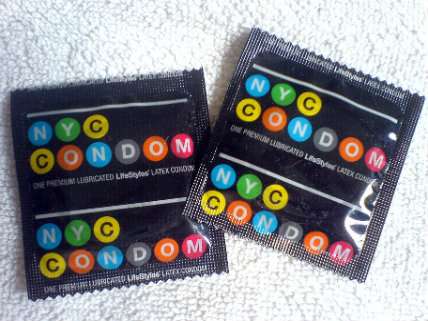An End to New York's War on Condoms?

Under current New York policy, cops can confiscate condoms as "evidence" of prostitution—and it happens regularly. "There may be no actual evidence, and the condom is their only way to trying to prove it," male escort turned advocate Hawk Kinkaid told the Associated Press. But a bill that would prohibit the existence of multiple condoms from being used as evidence in prostitution cases may finally have a chance in the New York legislature, according to the Associated Press.
Previous legislation of this sort in New York has failed. ("Sex workers are not a politically appealing constituency to most lawmakers," as Assemblyman Richard Gottfried, who supports the legislation, told AP.) But it passed the Assembly in June 2013. And a spokesman for Republican leaders in the recently reconvened Senate said the bill is under consideration.
Independently, some New York prosecutors have already put end to using condoms as sex work evidence. Brooklyn and Nassau County prosecutors said in 2013 that they would no longer use condoms as evidence in prostitution cases. In a statement Friday, the New York Police Department said it was taking a look at its condom confiscation policy.
In a 2012 report from the Sex Workers Project at the Urban Justice Center (UJC) and The PROS Network, half of sex workers surveyed said they sometimes didn't carry condoms for fear of law enforcement repercussions or had unprotected sex after police had confiscated condoms. "It's not a myth," Sienna Baskin, co-director of the Sex Workers Project at the UJC, told The Village Voice last year. "The practice of using condoms as evidence is very prevalent in New York."
But this isn't a police practice limited to New York. Washington, D.C., Los Angeles, and Pittsburgh are just a few cities where condoms can still be used as evidence. San Francisco only recently ended the practice. Carrying condoms is still criminalized in all of Louisiana and North Carolina.
These practices put us in line with anti-prostitution efforts in places like Kenya, Namibia, Russia, South Africa, and Zimbabwe—and out of line with established American privacy rights. In an article published in the Fordham Law Review last year, Meghan Newcomer noted that Griswold v. Connecticut established a fundamental privacy right in the use and access of contraception. "By taking condoms from suspected sex workers, police officers and departments are actually violating sex workers' constitutional right to privacy," Newcomer wrote.


Show Comments (22)